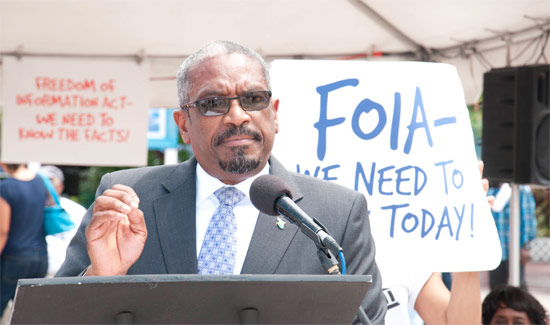 Passionate human rights activist and Save The Bays Director Joseph Darville engaged the members of Rotary’s Grand Bahama Sunrise Club recently as he spoke about “Rape, Pillage & Wanton Destruction of Our Patrimony Heritage of Land & Sea.”
Passionate human rights activist and Save The Bays Director Joseph Darville engaged the members of Rotary’s Grand Bahama Sunrise Club recently as he spoke about “Rape, Pillage & Wanton Destruction of Our Patrimony Heritage of Land & Sea.”
Having just returned from Bimini, Darville shared his findings and educated the Rotarians about Save The Bays, the rapidly-growing group seeking legislative, judicial and behavioural change to protect the Bahamas environment. The group (originally named The Coalition to Protect Clifton Bay) was established to fight the desecration of important marine environments in Nassau, particularly by private landowners and industry. Within months, it grew, joining forces with the support of other environmental groups and began an eco-partnership movement that has been nothing short of a groundswell. This led to the evolution of the name to Save The Bays to signify a spreading beyond Nassau to Bimini, Eleuthera and other threatened marina areas.
“Almost every island of The Bahamas faces potential damage due to development and lack of regulations,” said Darville, “and Save The Bays plans to visit them.” Darville told Rotarians he witnessed firsthand the destruction of seabeds in Bimini as a result of construction that created the Bimini Bay Resort, being developed by the Genting Group. “They have excavated millions of tons of the soft sea bed, endangering many species, all to create an embankment atop the narrow strip of sand and pine trees, all to build million dollar homes for second home owners,” claimed Darville.
In Bimini, the development in a sensitive mangrove area called Mosquito Point has devastated an area believed by Bahamians to be an important habitat for wildlife. While developers provided to the Government a private environmental impact study that claimed the area had no ecological value, scientists claim this particular area is reputed to be the most studied ecological system in the western hemisphere. Making it worse, all of this devastation has taken place without consultation by the native people.
This highlights the need for the government to create the Environmental Protection Act and the Freedom of Information Act, so that Bahamian land is protected and the public is aware of what is being developed, Darville said. Several Rotarians expressed surprise that the country did not have such regulations in place.
Locals in Bimini have also learned that construction of a thousand foot dock jutting out into the water on the west side of North Bimini is planned to accommodate daily gambling visitors. This, Darville explained, would be built opposite of where local residents live, not opposite the Bimini Bay development itself. That dock will connect with a six acre man-made island with a basin to accommodate a cruise ship, he said. Developers will have to excavate through one of the most famous dive environments in the world, he noted.
“The Government has approved this without any knowledge or input from the residents of Bimini,” said Darville.
Save The Bays group’s objective is to cause the Government to implement laws and regulations, which will guarantee the responsible and accountable use of our land. These will protect the land and seas, and whatever is in, on or beneath them, including oil or natural gas.
Darville highlighted his presentation with photographs showing the illegal expansion of Crown Land and destruction of marine habitats in Nassau by Peter Nygard, and oil seeping into the water from BEC in Clifton Bay. Rotarians were shocked to see the graphic examples.
Acting President of the Rotary Club of Grand Bahama Sunrise, Wayne Russell, stated that he and many others in attendance were avid boaters and many of Rotary’s community projects were centered around the ocean. They were then encouraged to sign the online petition (www.savethebays.bs), to assist in the mission to preserve The Bahamas.
Save The Bays, Coalition to Protect Clifton Bay is a licensed non-profit Bahamian corporation committed to preserving and protecting the delicate environmental, ecological and cultural balance of Clifton Bay and The Bahamas. Particular emphasis is given to encouraging effective land-use decisions and habitat restoration efforts that benefit the natural and human communities of the bay.
By Sarah Kirkby
Barefoot Marketing



